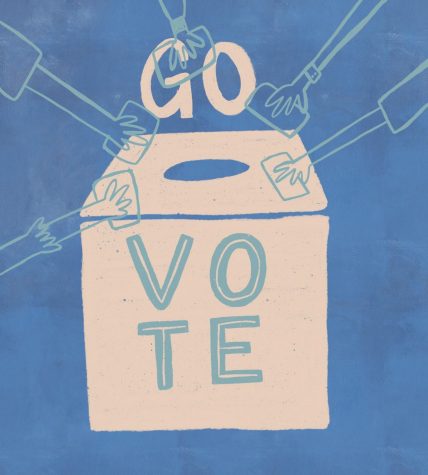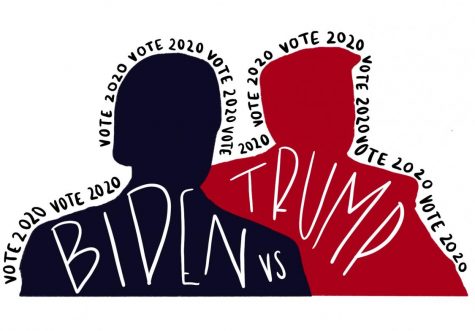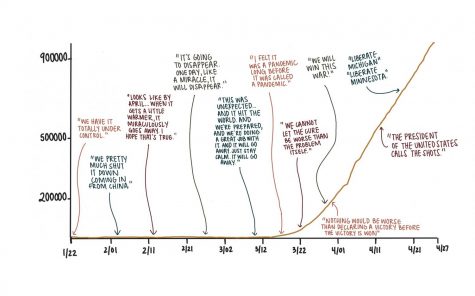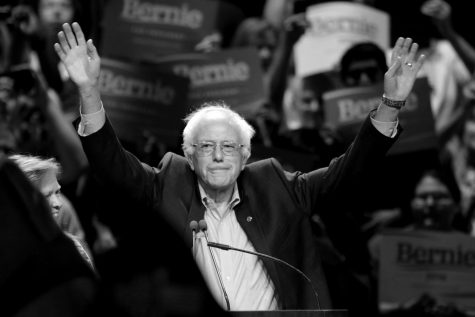Deplatforming Trump is Too Little, Too Late
Taking a stand against the Capitol insurrection Is enough to induce change.
The storming of the United States Capitol on Jan. 6 by a throng of white supremacists will surely go down into our history books. Yet, in some ways, the insurrection almost felt familiar. It looked like a social media feed morphed into mob form and walking in the real world. The insurrection put a face to the Twitter accounts of MAGA hat-wearers with bios self-proclaiming themselves as patriots followed by a row of American flag emojis, and to the Facebook posts accusing Democrats of being cannibalistic Hollywood pedophiles, plotting against Donald Trump.
Although I am not surprised that the events of Jan. 6 occurred, it marked the first time I have witnessed Donald Trump face consequences for his rhetoric. No, I am not talking about his presidency, nor the “betrayal” of his own administration, nor the subsequent series of business contract termination with his family businesses. I am talking about his Twitter account suspension, a consequence that not only affects him but also his connection with his base.
There is no doubt that Trump incited the Capitol violence through his words and tweets. However, the Capitol isn’t the first victim of his rhetoric nor was Jan. 6 the first time he used social media as a weapon to spread false information and encourage hate speech. Yet, it marked the first time that social media companies finally took action on his bigoted and dangerous online behaviors. After the election, Trump and his loyalists fabricated evidence about how the election was stolen from him. Even on the day of the riot, he called the violent attackers who stormed the Capitols “special.” It is the twisting of narratives and facts that is distinctive of Trump. After thousands of outlandish hurtful tweets and lies, Twitter finally curated his tweets, first by adding a disclaimer at the bottom of tweets about the election read, “This claim about election fraud is disputed,” and ultimately banned him from the platform permanently as a result of the insurrection. After that, Facebook joined in and suspended Trump’s accounts; eventually, other distribution platforms like Google Play and Apple banned Parler, a social networking service with a large number of users that supported Trump’s baseless claims of election fraud.
4 Years Too Late
Despite his new absence from big social media platforms, his myriad of petulant posts have already reached millions of people, incited violence and continue to breed white supremacy in this country. We can blame Donald Trump for bolstering white nationalist movements, but we can’t ignore the fact that his rhetoric was delivered successfully because of the lack of content moderation on social media sites. In another word, the platform that banned him permanently was still the ultimate enabler of his rise to power.
Prior to his presidential campaign 2016, I didn’t even know that Trump had made several attempts to run for president. Yet, with those attempts, his campaign strategy was not as tech-savvy as it became in 2016. In fact, Steve Bannon, his former campaign chief, created an online haven for alt-right nationalists called Breitbart News. Not only did Breitbart News repeatedly fabricat facts and condone white nationalism, but it was also a space for people to use to legitimize Trump’s rhetorics as facts. When asked how Breitbart ended up on some Facebook feeds in 2019, Facebook founder, Mark Zuckerberg, reaffirmed his company’s dedication to delivering highly curated news to his users, yet failed to curate Breitbart because he insisted that his users wanted to “have content that represents different perspectives.” How could anyone in 2019 possibly think that a title such as “Would You Rather Have Your Child Had Feminism or Cancer?” would represent quality news and contribute to diversity in political thought?
Prior to this year’s insurrection, mainstream social media platforms have had plenty of opportunities to stop the spread of illegitimate news and stem the extreme act of digital bullying emanating from Donald Trump. As for Facebook, it seems they cannot escape the fact that his campaign’s successfully generated $250 million in online fundraising using their platform. They value profits over their responsibility to hold their users accountable to their hurtful words and actions. The problem is not distinctive to Facebook. Twitter had served as the main form of direct communication from Trump to his supporters since his presidential campaign. They, too, stood by his online popularity and watched his virtual tweets become a disastrous reality. Their inaction is not just responsible for the insurrection, but a generation of misinformation and distrust of truth.
A Performative Action Doesn’t Solve a Much Larger Problem
Even now, with his permanent ban from social media, Trump’s posts have already reached their intended audience and done damage to the political foundations of our country. Despite recent efforts to deplatform prominent, harmful figures, it is impossible to weed out misinformation and extremism residing in real humans. Social media won’t help people disavow QAnon. Big Tech companies need to hold themselves accountable for breeding hard-to-remove extremism.
To reiterate, banning Trump is a mere symbolic act to attract the public’s attention. It took place in the final days of his presidency. What real impact does it have on our society? What else are these social media companies going to do to prevent extremist attacks, similar to what we saw on Jan. 6, from happening in the future?
There need to be real rules on content moderation. With the current algorithm, posts are rewarded and shared widely because of their sheer number of likes and interactions, regardless of the tone and context. The ultimate goal of these convoluted models is to feed users with an indefinite amount of content. The problem will continue to lie in the lack of human rights standards in the current content moderation system. Yes, cementing basic human decency into their application’s terms of service might cost a subpopulation of their users, but that’s the least of my concern.
Your donation will support the student journalists of Saint Louis University. Your contribution will help us cover our annual website hosting costs.










